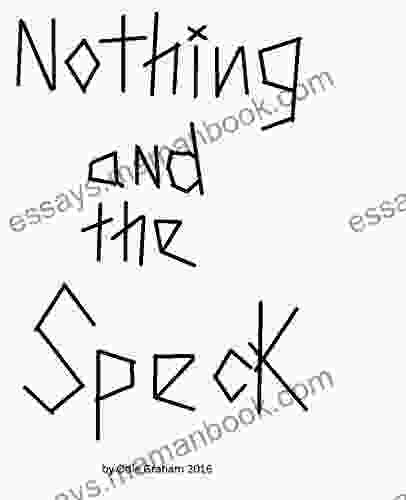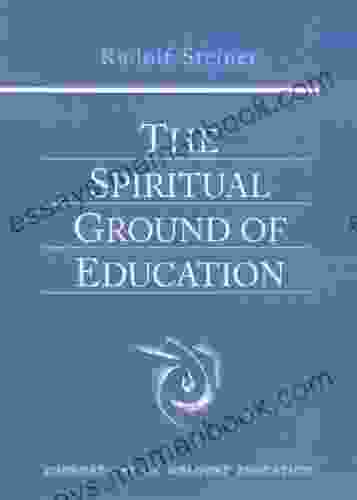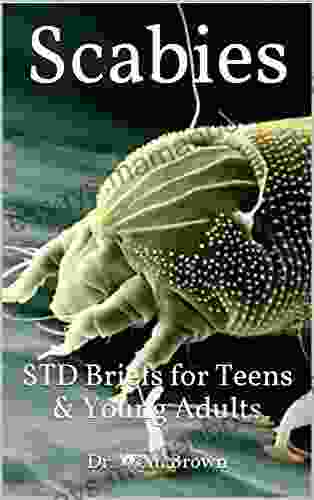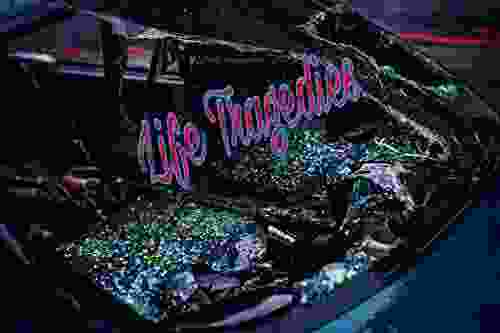The Spiritual Ground of Education

In the tapestry of human existence, education plays a pivotal role in shaping our intellect, skills, and worldview. However, beyond the acquisition of knowledge and technical proficiency lies a deeper dimension—the spiritual ground of education.
The spiritual ground of education acknowledges the inherent interconnectedness between our physical, emotional, and spiritual selves. It recognizes that true learning extends beyond the confines of the classroom, encompassing a holistic understanding of the world and our place within it.
5 out of 5
| Language | : | English |
| File size | : | 571 KB |
| Text-to-Speech | : | Enabled |
| Screen Reader | : | Supported |
| Enhanced typesetting | : | Enabled |
| Word Wise | : | Enabled |
| Print length | : | 162 pages |
| Lending | : | Enabled |
The Transformative Power of Inner Wisdom
At the core of the spiritual ground of education lies the concept of inner wisdom. This is not simply a body of knowledge but a deep, intuitive knowing that transcends rational thinking. It is a wellspring of insights, values, and guiding principles that emerge from within our innermost being.
Inner wisdom is not confined to any particular religion or belief system. It is an innate capacity that resides within each of us, waiting to be awakened. Through contemplation, introspection, and connection with our higher selves, we can access this profound source of guidance.

When we cultivate inner wisdom, it transforms our educational experiences. It deepens our understanding of concepts, fosters critical thinking, and empowers us to make choices aligned with our values. Inner wisdom helps us navigate the complexities of life with greater clarity, compassion, and resilience.
The Role of Spirituality in Education
Spirituality, in its broader sense, encompasses the human search for meaning, purpose, and connection with something greater than ourselves. It is not synonymous with religion, but rather an inherent aspect of our human nature.
In education, spirituality provides a framework for exploring questions of existence, values, and ethics. It fosters an environment where students are encouraged to reflect on their beliefs, values, and the impact of their actions on themselves and others.
Integrating spirituality into education helps students develop a sense of purpose and meaning in their lives. It nurtures empathy, compassion, and a commitment to serving the greater good. By addressing the spiritual dimension of education, we empower students to become responsible, ethical, and globally-minded citizens.
Practices for Fostering Spiritual Growth
There are numerous practices that can be incorporated into education to foster spiritual growth and cultivate inner wisdom. These include:
- Meditation: Regular meditation practice helps calm the mind, promote self-awareness, and cultivate inner peace.
- Mindfulness: Being present in the moment allows us to observe our thoughts, feelings, and actions with greater clarity and compassion.
- Yoga: The physical and mental practices of yoga enhance body awareness, improve concentration, and foster a sense of well-being.
- Nature immersion: Spending time in nature has been shown to reduce stress, promote mental clarity, and deepen our connection with the natural world.
- Dialogue and discussion: Open and respectful dialogue about spirituality, values, and life experiences can foster understanding and empathy.
The Benefits of a Spiritually-Grounded Education
A spiritually-grounded education offers numerous benefits to students and educators alike. These include:
- Enhanced academic performance: Studies have shown that students who engage in spiritual practices tend to have better academic outcomes, including improved attention, memory, and problem-solving abilities.
- Increased self-awareness: Spiritual growth fosters self-reflection, leading to a deeper understanding of one's strengths, weaknesses, and values.
- Stronger decision-making skills: By connecting with their inner wisdom, students are better equipped to make choices that align with their values and long-term goals.
- Enhanced creativity: Spirituality can stimulate imagination, foster curiosity, and provide a source of inspiration for creative expression.
- Greater resilience: Spiritual practices help students develop coping mechanisms for dealing with stress, adversity, and life's challenges.
The spiritual ground of education is a fertile ground for cultivating wisdom, meaning, and purpose. By embracing the transformative power of inner wisdom and integrating spirituality into our educational systems, we empower students to become lifelong learners, compassionate citizens, and responsible stewards of our world.
As we navigate the complexities of the 21st century, a spiritually-grounded education is more essential than ever. It provides the foundation for a fulfilling life, characterized by a deep understanding of oneself, a commitment to serving others, and a profound connection with the world around us.
5 out of 5
| Language | : | English |
| File size | : | 571 KB |
| Text-to-Speech | : | Enabled |
| Screen Reader | : | Supported |
| Enhanced typesetting | : | Enabled |
| Word Wise | : | Enabled |
| Print length | : | 162 pages |
| Lending | : | Enabled |
Do you want to contribute by writing guest posts on this blog?
Please contact us and send us a resume of previous articles that you have written.
 Top Book
Top Book Novel
Novel Fiction
Fiction Nonfiction
Nonfiction Literature
Literature Paperback
Paperback Hardcover
Hardcover E-book
E-book Audiobook
Audiobook Bestseller
Bestseller Classic
Classic Mystery
Mystery Thriller
Thriller Romance
Romance Fantasy
Fantasy Science Fiction
Science Fiction Biography
Biography Memoir
Memoir Autobiography
Autobiography Poetry
Poetry Drama
Drama Historical Fiction
Historical Fiction Self-help
Self-help Young Adult
Young Adult Childrens Books
Childrens Books Graphic Novel
Graphic Novel Anthology
Anthology Series
Series Encyclopedia
Encyclopedia Reference
Reference Guidebook
Guidebook Textbook
Textbook Workbook
Workbook Journal
Journal Diary
Diary Manuscript
Manuscript Folio
Folio Pulp Fiction
Pulp Fiction Short Stories
Short Stories Fairy Tales
Fairy Tales Fables
Fables Mythology
Mythology Philosophy
Philosophy Religion
Religion Spirituality
Spirituality Essays
Essays Critique
Critique Commentary
Commentary Glossary
Glossary Bibliography
Bibliography Index
Index Table of Contents
Table of Contents Preface
Preface Introduction
Introduction Foreword
Foreword Afterword
Afterword Appendices
Appendices Annotations
Annotations Footnotes
Footnotes Epilogue
Epilogue Prologue
Prologue Ingersoll Lockwood
Ingersoll Lockwood Louis Aragon
Louis Aragon Oliver Theobald
Oliver Theobald Adam Vandergrift
Adam Vandergrift Adedayo Phillips
Adedayo Phillips Tennessee Williams
Tennessee Williams Galen Anderson
Galen Anderson Eisha Armstrong
Eisha Armstrong James Tate
James Tate Lisa Renee Hutchins
Lisa Renee Hutchins Yana Toboso
Yana Toboso William Mcmillen
William Mcmillen Mike Shelton
Mike Shelton Vironika Wilde
Vironika Wilde Brian Fried
Brian Fried By S Bunny Goodman
By S Bunny Goodman Adrian Ernesto Cepeda
Adrian Ernesto Cepeda Nancy Bailey
Nancy Bailey Heather Trefethen
Heather Trefethen Susan Kaiser Greenland
Susan Kaiser Greenland
Light bulbAdvertise smarter! Our strategic ad space ensures maximum exposure. Reserve your spot today!
 Ed CooperFollow ·18.2k
Ed CooperFollow ·18.2k Preston SimmonsFollow ·6k
Preston SimmonsFollow ·6k Dwight BellFollow ·9.7k
Dwight BellFollow ·9.7k Ruben CoxFollow ·16.6k
Ruben CoxFollow ·16.6k Samuel BeckettFollow ·8.6k
Samuel BeckettFollow ·8.6k Douglas PowellFollow ·11.5k
Douglas PowellFollow ·11.5k Junichiro TanizakiFollow ·16.9k
Junichiro TanizakiFollow ·16.9k Allen GinsbergFollow ·13.7k
Allen GinsbergFollow ·13.7k

 Dean Butler
Dean ButlerBlack Widow 2024: A Comprehensive Guide to Kelly...
In 2024, Marvel...

 Gage Hayes
Gage HayesNothing and the Speck: An In-Depth Analysis of Yana...
Yana Toboso's works, particularly the manga...

 Stan Ward
Stan WardThe Best American Poetry 1997: James Tate
The Best American Poetry...

 Corey Green
Corey GreenThe Chance of Home: Exploring the Poetic Landscape of...
Immerse yourself in the evocative world of...
5 out of 5
| Language | : | English |
| File size | : | 571 KB |
| Text-to-Speech | : | Enabled |
| Screen Reader | : | Supported |
| Enhanced typesetting | : | Enabled |
| Word Wise | : | Enabled |
| Print length | : | 162 pages |
| Lending | : | Enabled |














